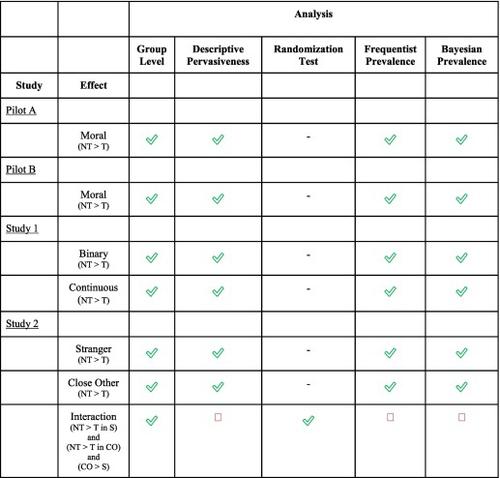当前位置:
X-MOL 学术
›
Journal of Experimental Social Psychology
›
论文详情
Our official English website, www.x-mol.net, welcomes your
feedback! (Note: you will need to create a separate account there.)
Most people do not “value the struggle”: Tempted agents are judged as less virtuous than those who were never tempted
Journal of Experimental Social Psychology ( IF 3.2 ) Pub Date : 2024-03-29 , DOI: 10.1016/j.jesp.2024.104615 Ryan M. McManus , Helen Padilla Fong , Max Kleiman-Weiner , Liane Young
Journal of Experimental Social Psychology ( IF 3.2 ) Pub Date : 2024-03-29 , DOI: 10.1016/j.jesp.2024.104615 Ryan M. McManus , Helen Padilla Fong , Max Kleiman-Weiner , Liane Young

|
Do people judge those who overcome temptation as more virtuous than those who don't feel tempted in the first place? Because prior research provides conflicting answers to this question, the current paper uses an expanded set of methodological and statistical tools to solve this puzzle. First, we replicated results of prior research showing that agents who overcome temptation are seen as less virtuous than non-tempted agents, with 74–78% of people making this judgment. Second, we used participant-generated stimuli and one measure from each of two published papers to rule out stimulus and measurement sampling as explanations for the previous opposite effects. We replicated our original results: 72–75% of people judged agents who overcame temptation as less virtuous than non-tempted agents. Third, we investigated whether judgments were moderated by relationship context. Again, the majority of people judged agents who overcame temptation–that would harm strangers or close others–as less virtuous than non-tempted agents. Additionally, the following interaction effect was the most common (modal) pattern: While judging tempted agents as less virtuous than non-tempted agents within each relationship context, 39% of people judged agents who were tempted to act in a way that would harm close others as even less virtuous than those agents whose temptations would harm strangers. Together, these results provide a detailed moral psychological account of temptation by: resolving a puzzle in the literature, revealing moderation by relationship context, and documenting the pervasiveness of this effect across stimuli, measures, and persons.
中文翻译:

大多数人并不“重视斗争”:受诱惑的特工被认为不如那些从未受过诱惑的特工有德行
人们是否认为那些克服诱惑的人比那些一开始就没有受到诱惑的人更有道德?由于先前的研究对这个问题提供了相互矛盾的答案,因此本文使用一组扩展的方法和统计工具来解决这个难题。首先,我们重复了之前的研究结果,显示克服诱惑的人被认为比未受诱惑的人道德较差,74-78% 的人做出了这样的判断。其次,我们使用参与者产生的刺激和两篇已发表论文中的每一篇的一种测量来排除刺激和测量抽样作为对先前相反效果的解释。我们重复了最初的结果:72-75% 的人认为克服诱惑的人比未受诱惑的人道德较差。第三,我们调查了判断是否受到关系背景的调节。同样,大多数人认为那些克服了诱惑(会伤害陌生人或亲密他人)的代理人不如未受诱惑的代理人有道德。此外,以下交互作用是最常见的(模态)模式:在每种关系背景下,虽然判断受诱惑的代理人不如未受诱惑的代理人有道德,但 39% 的人认为受诱惑的代理人会做出伤害亲密关系的行为。其他人的道德甚至不如那些诱惑伤害陌生人的代理人。总之,这些结果通过以下方式提供了对诱惑的详细道德心理学解释:解决文献中的难题,揭示关系背景的适度性,并记录这种效应在刺激、措施和个人中的普遍性。
更新日期:2024-03-29
中文翻译:

大多数人并不“重视斗争”:受诱惑的特工被认为不如那些从未受过诱惑的特工有德行
人们是否认为那些克服诱惑的人比那些一开始就没有受到诱惑的人更有道德?由于先前的研究对这个问题提供了相互矛盾的答案,因此本文使用一组扩展的方法和统计工具来解决这个难题。首先,我们重复了之前的研究结果,显示克服诱惑的人被认为比未受诱惑的人道德较差,74-78% 的人做出了这样的判断。其次,我们使用参与者产生的刺激和两篇已发表论文中的每一篇的一种测量来排除刺激和测量抽样作为对先前相反效果的解释。我们重复了最初的结果:72-75% 的人认为克服诱惑的人比未受诱惑的人道德较差。第三,我们调查了判断是否受到关系背景的调节。同样,大多数人认为那些克服了诱惑(会伤害陌生人或亲密他人)的代理人不如未受诱惑的代理人有道德。此外,以下交互作用是最常见的(模态)模式:在每种关系背景下,虽然判断受诱惑的代理人不如未受诱惑的代理人有道德,但 39% 的人认为受诱惑的代理人会做出伤害亲密关系的行为。其他人的道德甚至不如那些诱惑伤害陌生人的代理人。总之,这些结果通过以下方式提供了对诱惑的详细道德心理学解释:解决文献中的难题,揭示关系背景的适度性,并记录这种效应在刺激、措施和个人中的普遍性。































 京公网安备 11010802027423号
京公网安备 11010802027423号